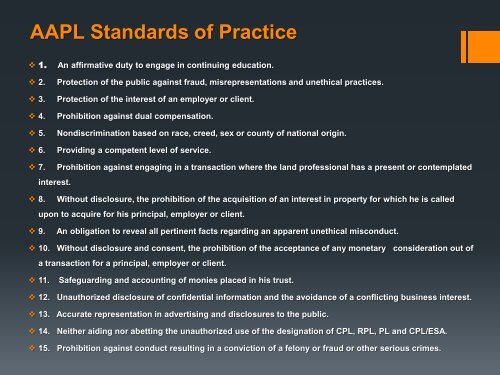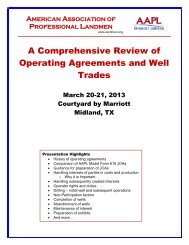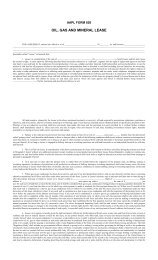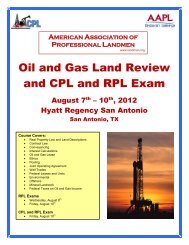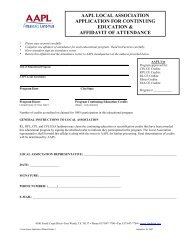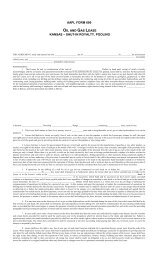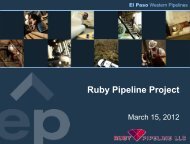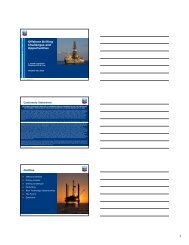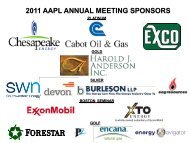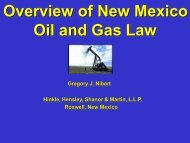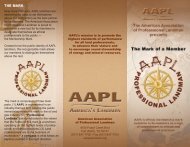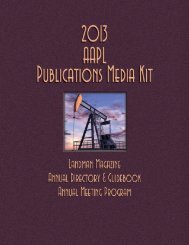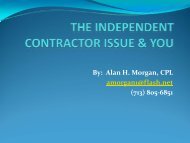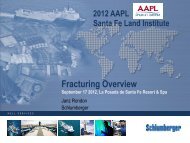Ethics Panel
Ethics Panel
Ethics Panel
You also want an ePaper? Increase the reach of your titles
YUMPU automatically turns print PDFs into web optimized ePapers that Google loves.
AAPL Standards of Practice<br />
1.<br />
2.<br />
3.<br />
4.<br />
5.<br />
6.<br />
An affirmative duty to engage in continuing education.<br />
Protection of the public against fraud, misrepresentations and unethical practices.<br />
Protection of the interest of an employer or client.<br />
Prohibition against dual compensation.<br />
Nondiscrimination based on race, creed, sex or county of national origin.<br />
Providing a competent level of service.<br />
7. Prohibition against engaging in a transaction where the land professional has a present or contemplated<br />
interest.<br />
8. Without disclosure, the prohibition of the acquisition of an interest in property for which he is called<br />
upon to acquire for his principal, employer or client.<br />
9.<br />
An obligation to reveal all pertinent facts regarding an apparent unethical misconduct.<br />
10. Without disclosure and consent, the prohibition of the acceptance of any monetary consideration out of<br />
a transaction for a principal, employer or client.<br />
11.<br />
Safeguarding and accounting of monies placed in his trust.<br />
12. Unauthorized disclosure of confidential information and the avoidance of a conflicting business interest.<br />
13. Accurate representation in advertising and disclosures to the public.<br />
14. Neither aiding nor abetting the unauthorized use of the designation of CPL, RPL, PL and CPL/ESA.<br />
15. Prohibition against conduct resulting in a conviction of a felony or fraud or other serious crimes.
Question 1<br />
You are reviewing documentation on a warranty deed to be executed<br />
for the purchase of property from a local Economic Development<br />
Authority (EDA). The State statutes require covenants to be inserted<br />
into any deed from an EDA to a private party. These include<br />
restrictions on current and future use and sale of the land, and the<br />
statutes indicate that these restrictions need to run with the land. The<br />
attorney for the EDA has not put the restrictive covenants in the draft<br />
deed.<br />
The purchasing company's attorney has indicated that it is the EDA's<br />
responsibility to determine what needs to be in the deed.<br />
What do you do
Question 2<br />
Your company, Whiz-Bang Mining, is excited about a newly developing<br />
project. The Whiz-Bang exploration team has just drilled several holes with<br />
screaming results. They tell you this is a company-making project but there<br />
is a third-party controlled property interior to the project which is critical to the<br />
project. The promising drill holes are immediately adjacent to this property<br />
and the geologic models indicate that the best mineralization extends under<br />
the third-party property.<br />
What, if any, obligations do you have to disclose the results of the drilling<br />
during your negotiations to acquire the property<br />
Is the disclosure obligation different if the third-party is another mining<br />
company vs. an elderly widow who lives out of state<br />
Is the disclosure obligation different if the widow asks you whether there<br />
has been any recent exploration in the area; why you are interested in<br />
her property; or your intended use of the property<br />
Is your disclosure obligation different if the widow confides in you that<br />
she isn’t knowledgeable about this sort of thing but she thinks you seem<br />
like a nice person and is sure she can trust you not to mislead her
Question 3<br />
Your company, Mine it All Inc., is in a joint venture with Flakey Mining<br />
Company. Your company owns 60% and is manager of the JV. Flakey owns<br />
the remaining 40%. Flakey decided to sell its interest and after shopping<br />
around found a buyer who was willing to pay them $1M. Your company<br />
thinks $1M is a cheap price for the 40% and exercised its right of first refusal<br />
under the JV. Your company and Flakey have started working on drafts of<br />
the purchase agreement to close the transaction and terminate the JV<br />
agreement. Being a diligent company, Flakey issued a press release<br />
disclosing the pending sale. Following this press release you were contacted<br />
by one of the parties Flakey originally approached but who was reluctant to<br />
purchase only 40% of the project. This party is interested in buying out<br />
100% of the project and has indicated they would pay a significant premium<br />
over the value implied by the $1M price for 40%.<br />
Since the purchase agreement has not yet been<br />
signed, do you have any obligation to inform Flakey of<br />
the new information<br />
As manager of the JV do you have any obligation to<br />
inform Flakey of the contact from a potential buyer of<br />
the JV assets
Question 4<br />
Your company, Good as Gold Minerals, signed a confidentiality agreement with Quick<br />
and Loose Mining Company. The term of the confidentiality agreement is due to<br />
expire in 30 days. Quick and Loose has data on several properties including the Big<br />
Bonanza claim group which it holds under lease from the underlying owner. You<br />
think the lease terms are very onerous and will need to be renegotiated if you make a<br />
deal with Quick and Loose. Under terms of the confidentiality agreement Quick and<br />
Loose gave your company access to its drill samples from the Big Bonanza claims.<br />
In order to save money Quick and Loose used Cheapo Labs to assay the drill<br />
samples and the results came back very negative. Your company decided to reassay<br />
the samples and the results were so exceptional it caused the entire<br />
exploration staff to swoon. After recovering his senses the Exploration VP<br />
approached you with a crazed look in his eyes and asked you to purchase the Big<br />
Bonanza claims as quickly as possible. In the meantime, Quick and Loose contacted<br />
you to tell you that based on the poor assay results they dropped the lease on the<br />
Big Bonanza claims.<br />
PART 2: 1: 3:<br />
Assuming When you the contact confidentiality the owner agreement of the Big Bonanza has no express<br />
claims are<br />
restriction obligation you obligated to on disclose, acquiring to are property your assay obligated either results during to disclose or Does after the your the<br />
confidentiality results answer of change your agreement assays if you know to Quick expires that and Quick do Loose you and have Loose Would any has obligation this given<br />
to change their Quick poor if and Quick assay Loose and results before Loose to the you alerted owner contact you before the owners they of dropped the Big<br />
Bonanza the lease claims and wanted Does to this know change if you if had you any wait interest to allow in the<br />
confidentiality property agreement to expire
Question 5<br />
Rusty is a company Landman who in the course of a field check, he<br />
discovers that the federal mining claims his company holds were never<br />
posted on the ground, only paper staked (location monuments, but not<br />
corners).<br />
What should Rusty do<br />
Some prospecting work (i.e. non-invasive) has been done on some of<br />
the "claims" and more is planned on the project in the near future. So<br />
far, the area has not been staked by a competitor.<br />
What does Rusty do<br />
As a consulting landman/surveyor for either the company in question or<br />
for a competitor what would be different about this scenario
Question 6<br />
Rusty Bucket (still a company Landman) and now a little nervous about his<br />
claims, decides to check on some other unpatented mining claims his new<br />
surveyor has just staked. Rusty walks down the road and in the course of<br />
looking for corners, he finds some old mining equipment. To most people, it<br />
would look like trash, but there are some small pieces and they will fit in the<br />
back of Rusty’s pickup, besides, he thinks they will look great in his yard as<br />
“yard art”.<br />
Is this okay Or what should Rusty do<br />
What if I were on company patented ground<br />
Would it matter if it were farm equipment
If there is a concern or confusion relating to the ethical propriety of a situation,<br />
it is best to avoid the situation.<br />
Restated, it is better to err on the side of caution for it is often the appearance<br />
of an impropriety and not an actual impropriety that causes damage.<br />
A vast amount of ethical challenges involve relationships which are strained<br />
with even the appearance of a problem. Always be vigilant of the appearance<br />
of any impropriety.<br />
Jan T. van Loon


